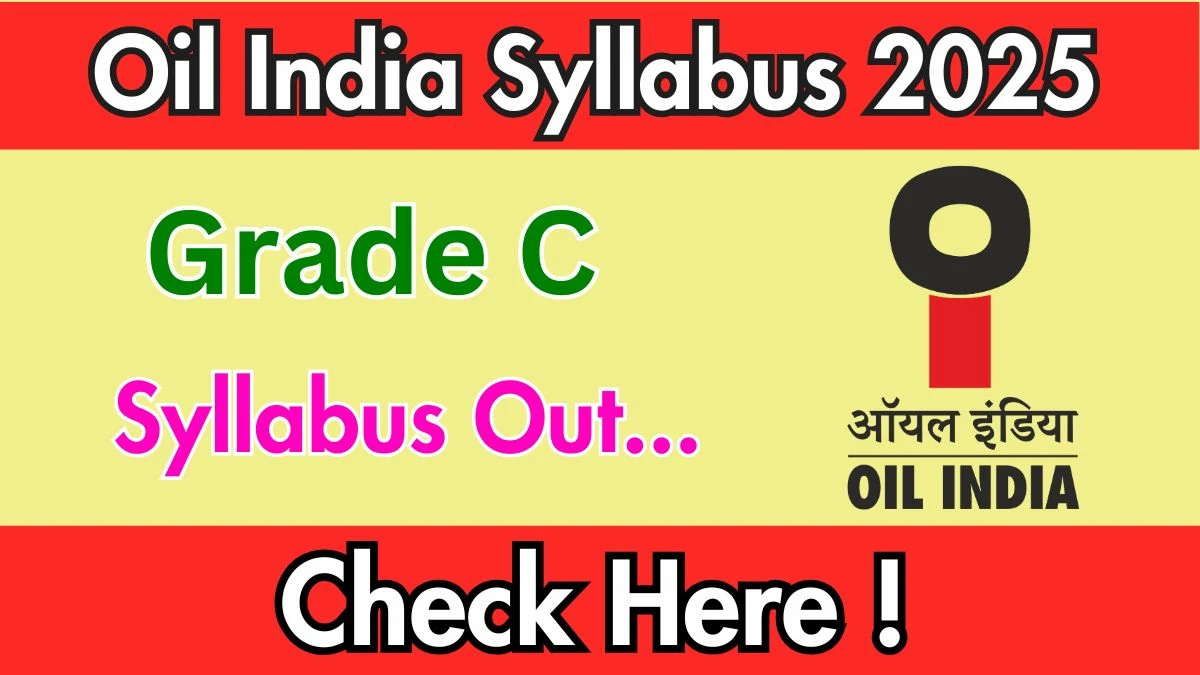Oil India Grade C Syllabus 2025 Overview
The Oil India has published the official syllabus and exam pattern for the Grade C recruitment exam. To ensure a well-structured study plan, candidates aiming for the Oil India Grade C exam should thoroughly review both sections of the syllabus. Understanding the detailed syllabus and exam structure is essential for effective preparation.
| Exam Name | Oil India Grade C Recruitment |
| Conducting Authority | Oil India |
| Number of Vacancies | 54 |
| Selection Process |
|
| No.of Questions | 100 |
| Duration | 2 hours |
| Total Marks | 100 |
| Negative Marking | No Negative Mark |
| Official Website | oil-india.com |
Oil India Grade C Syllabus 2025
The syllabus is an important part of your exam preparation. It lists all the topics you need to study, helping you focus on what’s important. To do well in the Oil India Grade C exam 2025, make sure you understand the syllabus fully. It covers both general subjects and specific topics related to the post. Use the syllabus to guide your studies and ensure you're covering everything needed for the exam.
1. Superintending Geologist
- Structural Geology: Rock mechanics, folds, faults, tectonics, experimental geology, plate tectonics, tectonic structures of India.
- Stratigraphy: Modern approaches, facies, correlation methods, sequence and seismic stratigraphy, geology of Indian Peninsula and Himalayas.
- Igneous & Metamorphic Petrology: Origin and classification of magmas/rocks, rare earth elements, volcanic provinces, granites, ophiolites.
- Geomorphology & Seismology: Geomorphological controls, weathering, soil classification, drainage analysis, coastal landforms, tectonic geomorphology.
- Geological & Geochemical Exploration: Exploration stages, mapping, sampling, drilling, isotope applications, mineral exploration.
- Remote Sensing: Principles, aerial photography, photogeological mapping, interpretation, GIS concepts, global missions.
- Palaeontology: Taphonomy, microfossils, biofacies, applications in hydrocarbon and climate studies.
- Non-conventional Energy: Basics of geothermal, solar, tidal energy.
- Geoscientific Data Analysis: MATLAB, Petrel, simulation, reservoir modeling.
- Sedimentology: Sedimentary processes, textures, facies, provenance, stable isotope applications.
- Geochemistry: Principles, element distribution, isotopes, source rock evaluation.
- GIS: Fundamentals, data models, projection systems.
- Geophysical Exploration: Surveying techniques, seismic methods.
- Petroleum Geology: Origin, migration, reservoirs, traps, Indian oil fields, enhanced oil recovery (EOR).
2. Manager (F&A)
- Financial Accounting & Reporting: Accounting standards, financial statements under Companies Act.
- Cost & Management Accounting: Costing methods, CVP analysis, inventory management, budgetary control.
- Company Law & Allied Laws: Companies Act 2013, IBC 2016, Indian Contract Act, etc.
- Tax Laws: Direct taxes (Income Tax Act), indirect taxes (GST, Customs, FTP).
- Auditing & Assurance: Standards, internal control, types of audits.
- Accounts Payable & Receivable: Procure-to-pay, order-to-cash, TDS, reconciliations.
- Cash, Bank, Treasury & Insurance: BRS, liquidity management, LC/BG, insurance principles.
- Payroll Accounting: Payroll processing, statutory deductions.
- Case Studies/Scenarios: Practical applications in accounting, tax, cost analysis, optimization.
3. Superintending Engineer (Instrumentation, Pipeline T&I, Electrical, Civil, Drilling, Production, Environment, Logistics, Field Engineering, Pipeline Mechanical, Reservoir, etc.)
- Engineering Fundamentals: Mathematics, circuits, control systems, power electronics, civil, mechanical, electrical, instrumentation, environmental, reservoir, petroleum engineering.
- Specialized Areas: SCADA, PLC/DCS, process control, calibration, industrial standards (API, OISD), SAP, ERP, procurement, safety standards.
- Regulatory Knowledge: Mines Act, OMR, ISO, national/international codes, environment and labour legislation.
4. Manager (HR) / Manager (Contracts & Purchase)
- HR Principles: Industrial relations, labour laws, dispute resolution.
- Procurement: Government policies, MSME, public procurement, customs, GST, SAP, GEM.
Download Oil India Grade C Syllabus PDF
Aspirants can access the detailed Oil India Grade C Syllabus PDF to get a clear overview of all the topics essential for the exam.
Click Here - Oil India Grade C Syllabus PDF
| Simple, Fast & Free! No Sign Up Required! | |
| Image Resizer | PDF to Word Converter |
| Image to PDF Converter | Word to PDF Converter |
Oil India Grade C Exam Preparation Tips
To prepare effectively for the Oil India Grade C exam, candidates should follow these commonly recommended preparation tips:
- Understand the Exam Pattern and Syllabus - Review the syllabus and exam pattern to plan effectively.
- Create a Study Schedule - Organize your study time for both General and Nursing subjects.
- Refer to the Best Study Materials - Use recommended books and resources for each subject.
- Practice Regularly - Solve practice papers and previous year’s questions to improve your skills.
- Focus on Conceptual Clarity - Focus on understanding core concepts, not just memorization.
- Improve Speed and Accuracy - Practice answering questions quickly and accurately.
- Stay Updated with Current Affairs - Read newspapers and follow online resources for current events.
- Maintain a Healthy Lifestyle - Eat well, stay hydrated, and take regular breaks.
- Revision is Key - Regularly revise topics to ensure better retention.
- Stay Positive and Motivated - Stay confident and motivated throughout your preparation.

